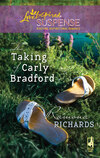Kitabı oku: «A Murder Among Friends», sayfa 2
TWO
Judson was meticulous, insisting especially on a spotless kitchen in which to cook the gourmet meals he cherished. Three maids in the last year had quit, unable to live up to his requirements.
Fletcher dumped the clothes out of his hastily packed bag onto the rumpled bed and sorted them into piles of clean, dirty and suits. He hung the suits in the tiny cabin closet, then dumped the clean pile into one drawer of the dresser, the dirty into another. He sat on the squeaky bed, trying to ignore the smell of sour food and stale sweat in the cabin, and pulled a small notebook and a pen out of his jacket to look over the notes he’d taken so far. As he went through the list, his left heel bounced nervously against the floor, and the pen clicked as his thumb snapped up and down on its release.
Aaron Jackson’s body showed that he had apparently died from a severe blow to the right side of his head, crushing his temple. He had been discovered by the estate manager, Maggie Weston, around midnight Monday, lying facedown on the back steps of the lodge house deck. His head was on the last step, his feet near the top. She was found about half an hour later by the groundskeeper, Tim Miller, sitting on the steps beside the body in total shock. He and another resident, Scott Jonas, had to carry her inside.
The pen clicks picked up speed as he went down the list, and he paused, taking a deep breath, looking at his left hand. This is harder than I thought it would be. Even the pen brought back sharp memories that threatened to break through Fletcher’s tightly restrained emotions. Aaron had hated the clicking pen, recognizing it as one of Fletcher’s control mechanisms. The older man’s voice echoed in his head.
“Why don’t you go ahead and just lose that Scottish temper, me boyo? Emotions are good! They make life more intriguing.”
“I’m a cop. I can’t get emotionally involved with my cases.”
Aaron clucked his tongue. “So you’re made of steel, are you?”
Hardly, Fletcher thought, forcing his heel to stay flat on the floor and his feelings for Aaron to the far reaches of his mind. He took a deep breath. “Focus,” he murmured, looking down at the notebook again.
Fletcher’s brief examination of the body at the coroner’s showed that the wound to Aaron’s head was rounded—not flat or sharp—which was the impression a step, or the edge of a step, would have left. His body position was also odd and not that of a man who had fallen down steps. Bits of blood had been found approximately six feet out from the deck, with a few smears between that had been hastily covered. The wound was dotted with tiny bits of some material the ME couldn’t identify and contained almost no sign of wooden slivers. The coroner’s preliminary findings had confirmed this. They were still waiting on a final report.
Fletcher underlined his next note. So he was murdered and the body moved. No accident. Now, why would anyone want him dead? Fletcher took a deep breath and stood up, stretching, an odd weariness in his bones. He hadn’t slept well while he was at Korie and Aaron’s. Aaron was a midnight prowler, and Korie never seemed to shut up. No wonder Aaron spent dinnertime at the retreat with his writers and Maggie.
He frowned. Korie and Maggie. Both had been involved with Aaron, and the contrast between the two women was so stark that it was ludicrous. Korie, the flamboyant flirt, was the wild party child in New York and a restless, wandering artist here in New Hampshire. Maggie was stronger, more reserved. He remembered meeting her five years ago, when she and Aaron had been lovers….
Fletcher stood very still, a memory reaching through. An argument. Maggie and Aaron. About their relationship. Well, what else do couples fight about? But this had been different. How? Had Maggie still loved him? Was she jealous of Korie? Maybe. But Fletcher couldn’t remember anything else, and he shook his head to clear it.
He sat back down, turned the page in his notebook, clicked the pen twice and started another list. “Who would hate him enough to kill him?” he asked aloud.
“The list is endless,” Maggie said from the doorway.
Fletcher stood, his eyebrows raised. “Is eavesdropping part of your job?” he asked.
She smiled wryly. “When necessary.” She carried a large paper sack. “I brought you some things I thought you might need, since you aren’t one of our regular guests. They usually come prepared.” She set the bag on the desk and looked around at the small room, which had a tiny kitchenette in one end. The furnishings were simple: a desk with phone and computer ports, two comfy, overstuffed chairs, a bed, a dresser, a small eating table with two chairs. Maggie frowned at the bed.
“I brought clean sheets, for starters.” She began emptying the bag. “Jamie left in something of a hurry, and he was notorious for being a slob. I found an extra phone in one of our guest rooms, so you won’t always have to use your cell. Some of them won’t pick up a signal here, anyway. And I’ve got towels and soap.”
Fletcher stood back as she started stripping the sheets, wrinkling her nose. “Jamie was also notorious with the local girls. I just hope I don’t find one tied up in the bathroom.”
“No, it’s clean,” Fletcher replied. She paused and looked up at him, doubtful. He shrugged. “Well, not clean exactly.”
She laughed and tossed the dirty sheets into a pile. “I called the cleaning service and they should be here this afternoon. I’m sure Korie made promises to help, but she wouldn’t know which end of a broom to hold.” She grabbed the clean sheets and shook them out. Fletcher tucked his notebook back in his coat and reached to help her. “Thanks,” she said. “There’s a washer and dryer at the lodge if you need it. Have you looked over the brochure?”
Fletcher shook his head, watching Maggie peripherally as he shoved the corners of the sheets under the mattress. Pleasant, but too efficient. Too cooperative. What are you up to, Maggie?
“There aren’t a lot of rules around here,” she said, her voice taking on a routine note. He could tell she’d given this speech before. “But the ones we do have are enforced without fail.” She tucked a pillow under her chin and slid on a case. “One, everyone eats dinner in the lodge. Nights out have to be prearranged. You are on your own for breakfast and lunch. There are several restaurants in town, or you can keep groceries here, as long as you keep the place clean. No personal visitors except at the lodge, and no overnight guests who are not spouses. Aaron’s library, as well as the local public library, is available for research, and we ask that you make any long-distance calls from the lodge. There’s also an Internet connection, if your service doesn’t have a local number. There’s no long-distance service available in the cabins. We also keep up with the ones that are business and the ones that are personal. You won’t be charged for business calls. Cell phones, of course, are permitted, but they are not allowed at the dinner table.” The pillow landed on the bed with a fluff of scented air, and she went to the closet for blankets, her voice maintaining its monotone. “Please keep the thermostat at seventy-two degrees. You can come and go as you please, as long as you maintain the required production quota for the week. Aaron reviews everything on Saturday, so make sure you—”
Maggie froze and her eyelids fluttered. “You’re not a writer. Sorry.” Fletcher watched as she blinked away the glassiness from her eyes and took a deep breath. She crossed her arms over her stomach and bit her lower lip. Fletcher thought again about the two women who had loved Aaron Jackson so passionately. Korie, told of Aaron’s death, had wailed and flailed for an hour or so, with nothing but polite tears since. Maggie’s grief ran deeper, more consuming, and it looked as if it was going to last for a long time.
He gave her a moment, then spoke softly. “Tell me about the production requirements. Were they harsh?”
Maggie took a deep breath and seemed grateful. She nodded, sniffed and spoke evenly. “Yes. The application to get in here discourages most writers from even trying. They must have at least one mainstream novel published, with more than five thousand copies sold, with good reviews. They have to produce at least two short stories or a hundred pages of a novel a week, with a rough draft of a book, play or script per quarter. Flighty temperaments—and that covers a lot of writers—aren’t allowed. Aaron’s philosophy was that you were here to work, not be trendy. He also encouraged them to form critique groups, which meet in the lodge. He didn’t expect everything produced to be perfect—or even good—but you had to show you were serious about the work.”
“How long did most people stay?”
Maggie laughed. “Most leave within a couple of weeks. Aaron could be nasty about it. Aaron the Arrogant. That’s what a lot of them call him. And worse.”
“And the ones who stay?”
Maggie sat down on the bed. “They do some amazing work in the long run,” she said quietly. “It may look casual around here, but this isn’t a weekend conference of workshops. The cabins are only allotted out in three-month increments. They remain empty if someone leaves early. I’ve helped a lot of these folks write grants so they can stay here and still pay their mortgages, feed the kids. It’s hard work, very solitary and driving, and one reason Aaron requires everyone eat together is to force some type of community on them, so they won’t hole up in their cabins. It pays off. We’ve already produced two Pulitzer nominees, three Edgar winners, and two National Book Awards nominations. Aaron really is tough on them, but the ones who stay respond to his…” Her voice trailed off again, and she cleared her throat. “I guess I’m not used to the past tense yet.”
“Why did Jamie leave?”
Maggie sat up straighter. “Aaron. Jamie kept going out at night, bringing home the girls. Not allowed.” She smiled. “James Henry. Young and talented, but too immature. As arrogant as Aaron. Thought he was Henry James and that it would be easy. He chafed under Aaron’s rules. Told him to stay out of his personal life. They had a fight over the weekend, and Aaron tossed him out on his gifted behind.”
“This is not in the police report. Did you see the fight?”
Maggie shook her head. “All I told them was what I knew about Monday night. It was an accident, remember? As to the fight, I was at church with a couple of the others.” Fletcher raised an eyebrow, and Maggie scowled at him. “Don’t look so surprised, Fletcher. Not everyone who comes out of New York is decadent.”
Fletcher wiped his mouth, her words triggering a memory of a morose Aaron after his breakup with Maggie.
“She even got me going to church again.”
“What? And the roof stayed up? No lightning strikes?”
“Humph.” Aaron shook a smoldering cigar at Fletcher, scattering a few ashes. “You’re not the decadent you’d like people to think. It wouldn’t hurt you to darken the door of a church again.”
Fletcher brushed the ashes off the table to the floor. “What makes you think I don’t go?”
Aaron smirked. “’Cause I know you, and I know why you don’t go. And that hasn’t changed.”
Fletcher looked away. He didn’t want to talk about it.
Or think about it now. He cleared his throat. “Did anyone see the fight?”
“I doubt it, unless Tim overheard something. You could ask him. There are times I think he overhears everything. The fight did happen up at the lodge. Jamie, as you can see, left in a bit of a hurry. You’ll probably find leftover pizza in the fridge.”
Fletcher frowned. This was too easy; she was leading him somewhere, and it wasn’t where he wanted to go. “Who’s been here the longest?”
Maggie got up and peered into the bathroom, then winced. “I’ll see if the cleaning folks can’t get here sooner. And the microwave will probably be safer than the stove. We didn’t expect to move anyone in here for a week or two.”
“Maggie…” Fletcher nudged.
“Scott and Lily,” she said.
“A couple?”
Maggie nodded. “Scott Jonas is the writer. He’s been here several years now, almost from the beginning. Lily came and went for a while, then started staying here steadily about six months ago. Scott and Aaron fought a lot, but they seemed to understand each other.”
Fletcher stood a bit straighter. “Lily Dunne?”
Maggie stared at him. “Please don’t tell me you’re a fan.”
He shook his head. “No. I know Scott’s novels. Aaron had me read them. His bio said he was married to Lily Dunne. I know who she is, of course.”
Maggie nodded, chewing a bit on her lower lip. “Lily stays here, too. It’s a bit unusual, but Scott’s almost a permanent resident. They have the largest cabin, which is closest to the lodge.”
“Must be quiet here for her, after the lights of Broadway and L.A.”
Maggie responded by gathering up the dirty sheets and dumping them into a bag. “You’ll get to meet them tonight. Don’t forget—dinner’s at six.”
“Anyone else here who isn’t a writer?”
Maggie paused. “Me. And Tim, of course.”
Fletcher paused. Tim Miller was the retreat’s groundskeeper and the one who had found Maggie on the steps. Tyler had mentioned to him that Aaron had confidence in Tim, even though a background check had turned up a misdemeanor trespassing charge in Tennessee. Tim had said it was a political protest, something about taxes. The charge had been dismissed, and Aaron had never reported any problems. “He must help you a lot.”
Maggie’s eyes glistened with tears. “Yes.”
“Who else would hate Aaron?”
Maggie looked at him. “He’s alienated dozens of writers who thought this was paradise on earth. Aaron has—had—a temper that could shatter steel, but you know that, Fletcher. You knew him. You were one of his best friends. Who do you think would kill him?”
Fletcher looked her up and down, taking in every inch of her anger. His voice was quiet. “Anyone who despised or feared him.”
Maggie looked disgusted. “You have a gift for the obvious.” She stuffed the bag under her arm and started out the door.
“Or loved him,” Fletcher finished.
Maggie paused, then looked over her shoulder. “Do you always have to have the last word?” She repositioned the bag and tramped out, letting the door slam behind her.
Fletcher grinned. “Always.” He walked to the screen door of the cabin and watched her slender figure disappearing through the trees, wondering how much of her grief was real and how much was a calculated act. He knew she had intentionally handed him three major suspects on a silver platter, all without lying or stretching the truth, and he was aware that whomever she was protecting had probably been carefully excluded from the conversation. He sat down on his now-clean bed and took the notebook out, adding a few sharp scribbles to it, pausing only to click the pen twice. You’re playing a dangerous game, Maggie, he thought. And you’re not as good at it as you think you are.
Aaron flopped down on Fletcher’s ancient sofa, the bottle of Green Label Jack Daniel’s held loosely in his hand. “Men should stick together, me boyo,” he said, exaggerating the fake Irish brogue he always adopted when intoxicated, or when he wanted to appear intoxicated.
Fletcher noticed that the bottle was open but still full, and he wondered if it was the first bottle…or the second. He went to the kitchen to make a pot of coffee anyway, hoping to distract his friend from the whiskey. “You aren’t going to try to convince me you have women problems, are you?”
Aaron wagged his finger in the air, at no one in particular.“I am not as much the ladies’ man as my publicist would have the world believe, dear Fletcher. It is far more hype than history.”
Fletcher returned to the dimly lit living room and sat opposite Aaron in the sagging leather recliner he refused to get rid of. “So those thousands of women you’ve dated…”
Aaron shook his head. “Less than a hundred, I promise.”
Fletcher laughed. “More than most men can claim. Or would want to.”
Aaron sat up and peered at the bottle, clearly wanting to take a swig. “Well, most men could claim a bit of love along the way.”
Fletcher leaned back in his recliner. “If you’re expecting sympathy from me, you’re going about it in the wrong way.”
Aaron shook his head. “Nope. No sympathy. Just want to crash on your couch tonight. Don’t feel like driving back up to the retreat.”
Fletcher frowned. “What about the apartment? Korie—”
Aaron laughed abruptly. “Korie?” He paused and finally drank from the bottle, but the swallowing seemed painful and he grimaced. “Korie is…Korie is ‘en salon’ tonight. She couldn’t care less.”
“‘En salon’?”
Aaron put the bottle on the floor, lay down on the couch and propped his feet up on one arm. “Holding court with all her ‘artistes.’ She has illusions she’s the reincarnation of Mabel Dodge. Has dreams of re-creating a salon society and influencing the art world the way Dodge did a hundred years ago. They are all over the apartment. She won’t miss me until it’s time to order something, pay for something or tip someone for carrying something she’s bought.”
Fletcher was silent. After a moment, Aaron sat up. “I’m going to be sick now. Can I still stay?”
“As long as you want.”
Aaron laughed again as he headed for the bathroom. “Judson, my dear fellow, you may regret that offer.”
Fletcher grimaced as the door shut. Judson, the one name he hated hearing, the one name Aaron teased him with the most. It was going to be a long night.
The night turned into a week, and Korie had never once called or checked up on Aaron once during those seven days. Aaron’s anger and disgust at his wife dulled to a quiet cynicism, and at the end of the week, they had returned in separate cars to New Hampshire. Now she stood to inherit everything. If—and it was a big if—Maggie was right.
Fletcher threw his notebook on the bed and opened the door. Gazing up toward the lodge, he could see Maggie on the deck, looking in his direction. After a moment, she walked down the steps and disappeared along one of the trails. But if Korie were the killer, why would Maggie protect her? They hate each other. Fletcher smiled wryly. Perhaps, Maggie, me dear, you’ve muddied the water more than you realize.
Her feet cold and her mind numb, Maggie tramped through the woods behind the lodge again. She’d tried to do her job, had called the restaurant about tonight’s dinner and the cleaning service for Fletcher’s cabin, but nothing else. Her anger and grief of the morning seemed to have faded away, but it left nothing behind except a nagging twinge of guilt. Work should be her therapy, but she felt frozen, and everything in her office reminded her of Aaron. Thinking some cool air might help, she had gone out on the deck, then realized she just wanted to walk. She’d started down one of the trails, then left it, wandering aimlessly at first over the soft ground, relishing the last of the tiny white and purple wildflowers that dotted the ground in between spots of bright orange fungus on the tree roots. This land had been farm country until about seventy-five years ago, so the trees were relatively young and sparse, allowing for a lot of undergrowth. Maggie liked spotting new plants and trying to identify them, making almost every trip a bit of an adventure. She stopped, pulling a slice of bark off a birch tree. Breaking it into tiny bits as she looked around to get her bearings, she realized she was gradually heading west toward the edge of the property and an old logging road that only had one destination: Cookie’s.
Cordelia Holokaj, but all her nieces and nephews called her Ciotka Cookie. Maggie had found the Hansel-and-Gretel cottage on one of her first escapes into the woods to get away from the flaring temperaments of the retreat’s writers. Cookie had taken her in, served her hot chocolate and fresh gingersnaps, and told her stories from the world wars that made the retreat’s resident writers sound like poor amateurs. Cookie’s had been her retreat ever since.
The cottage always smelled like wood smoke, ginger, fresh bread and cabbage, and today was no different. Maggie stepped across the threshold and inhaled, much of her tension flooding away. “It’s so good to be here,” she murmured as Cookie gave her a hug. She bent down and scratched Cookie’s ancient mutt, Pepper, behind the ears. The overweight dachshund/sheltie mix grunted her contentment with the gesture.
“I was wondering when I’d see you,” Cookie said, her voice like gravel in a blender from her almost eighty years of cigarettes and New England winters. She motioned for Maggie to sit in one of the doily-covered horsehair chairs that crowded a tiny living room clustered with pictures, icons and books. A rickety upright piano sat against one wall, its stool covered with a well-worn blanket and its ivory keys yellow from years of enthusiastic fingers.
Maggie sat, curling her long legs beneath her, in one of the chairs next to the fireplace. Pepper waddled over to a spot between the chair and the fire, turned around once, then sank to the floor with a satisfied sigh. Pepper’s low, broad body was a perfect match to Cookie’s comfortable and huggable size.
Maggie took the offered cup of chamomile tea and found herself staring blankly into the gentle blazes of Cookie’s low fire. Cookie waited, stirring her tea and munching on a gingersnap.
“I didn’t realize how much it would hurt now that he’s gone,” Maggie said, finally. Cookie merely nodded and handed the younger woman a cookie. Maggie held it, then laid it on the arm of the chair. “I mean, I hadn’t loved him—I mean, been in love with him—for a long time. But, I mean, to have Korie acting like…and Fletcher MacAllister running around as if…” Maggie’s voice trailed off. Her numbness was giving way to confusion. What had happened to the resolve she’d felt earlier, to keep Fletcher at bay?
“What are you afraid of?”
Maggie was silent, uncertain if she should even tell Cookie.
The old woman cleared her throat. “This is a small town, Maggie. Never forget that. Never. Jackson’s Retreat does not exist in a vacuum. Word gets around. We mostly know who’s sleeping with whom, married or not. Or married to someone else. We also tend to know who’s trying to make a move, and whether the proposition’s been accepted.”
Maggie stared at her. “What are you saying?”
Cookie’s gaze was steady. “I’m saying most everyone around knows who Korie was sleeping with, and I don’t mean Aaron. How long are you going to keep quiet about it?”
“As long as I have to. Enough people have already been hurt.”
Cookie nodded. “One of them even killed.”
The tears slid from Maggie’s eyes and she set her cup aside. She got up, then knelt in front of Cookie, burying her face against the old woman’s knees. “Cookie, I was so angry! But now it just hurts. And I’m so scared.”
Cordelia Holokaj’s Polish parents had been killed in the concentration camps of World War II, and her only son had disappeared into the jungles of Laos, never to return. She knew grief, and fear, like few other people. She stroked Maggie Weston’s auburn curls. “You’ve gotta keep your head clear, baby. Don’t let what you felt for Aaron get in the way here. Don’t be lying to Fletcher MacAllister. Not only is it wrong, but it’ll come back to haunt you quicker than anything else you can do.”
Maggie raised her head, her eyes pleading. “But he could destroy everything I love.”
Cookie shook her head. “Not him. What’s done is done. He’s gonna shine some light on it, but his being around doesn’t make it more or less true.” She wiped Maggie’s face with her apron, and pushed her shoulders back. “You’re stronger than this. Be who you are. And stop lying to the man.”
Maggie got up and sat back in her chair. “I haven’t lied to him.”
Cookie raised both eyebrows. “Why didn’t you call the police?”
Maggie chewed her lower lip.
Cookie nodded. “Small town. Very small town.”
Maggie picked up her cup and stared into the tea.
Cookie watched her for a few moments. “What else, baby? This isn’t just about Aaron.”
Maggie sat up a bit straighter. “Not sure. Maybe Fletcher. I tried to lie to him, but I couldn’t—”
“Good thing. You’re a lousy liar. God’s too close to your heart.”
“Mama said it was ‘God’s finger’ poking at you.”
“Good mama. She knew you. When you believe as strongly as you do, it’s hard to turn your back on what you know is right, what you know God wants you to do.”
Maggie’s mouth twisted. “Yet I can’t let him know about—” She stopped and sipped her tea, her eyes starting to water. “He confuses me. He’s different than I remembered.”
“What’s different?”
Maggie shrugged. “I’m not sure. I saw him in his cabin this morning, and he was so calm, almost as if he were determined to make me talk.” She smiled. “And talk I did.”
Cookie snorted. “And you didn’t lie to him.”
Maggie shook her head.
“Just threw a little dirt around?”
Maggie stared at Cookie, a bit of her humor finally breaking through. “Now why in the world would I want to do that?
The old woman wagged her finger. “Now don’t think you can start trying to fool me either, baby. I know you too well.” She then stood up, motioning for Maggie to follow. “Come on. I have some dough rising on the stove. Let’s go whack some bread around.”
Maggie smiled finally and followed the old woman into the kitchen.
A local restaurant catered the retreat’s evening meals. Every day Maggie would help them set the trays of food on the counter separating the kitchen from the open and airy main room of the lodge, and the writers would go down the buffet line. Today was no different. As the restaurant workers left, Maggie started the coffeemaker, set out plates, napkins and glasses, then pulled assorted soft drinks, carafes of tea and Scott’s requested spring water out of the refrigerator.
She looked over the spread once more, then frowned. Three of the coffee cups were missing. She found one in the dishwasher, and she washed it and put it on the counter. She crossed the lodge to Tim’s room, knocking softly. He occasionally took coffee to his room after breakfast.
There was no answer, and she pushed the door open slowly. She hated invading his privacy; this was his home, too. Tim had only been here a few months, but he was as much a part of Aaron’s “extended family” as she was. She, for one, was grateful for Tim’s patience. They’d lost two groundskeepers before due to Aaron’s temper.
Tim’s room smelled faintly of machine oil and freshly mowed grass, but it was relatively neat. A computer that she had given him took up most of his desk, surrounded by printouts from landscaping sites and veterans groups. I didn’t know he was a veteran, Maggie thought. She tried not to look at the other papers, already feeling like a spy.
The two missing cups were on the nightstand, and Maggie grabbed them quickly and hurried back to the main room. She washed them, put them on the counter then checked over the table one more time. Sighing, she poured herself a cup of coffee and plopped down on an overstuffed couch in front of the fire, grateful for a few minutes of peace.
She looked around the room, feeling a melancholy sense of pride in what she saw. The A-frame lodge had been Aaron’s idea, as had many of the rules for the retreat. But the rest had been hers. She’d moved into the house when it was newly finished, still smelling of fresh wood and paint. She’d decorated it, shipping in some items from New York. Others were from local artisans. In addition to the main room, there were five bedrooms and a game room with a big-screen television in the basement. An extensive library and computer had been set up in the main room’s loft. A laundry and kitchen, which were open for anyone’s use, were at the beginning of the north wing, with her office on the other side of the main room from the kitchen at the end of the south hallway. One of the bedrooms was for visitors, with one each reserved for her, Tim and Aaron. The fifth one was reserved for one of the writers, and was a perk that was assigned on a first-come, first-deserved (in Aaron’s opinion, of course) basis. Currently, Tonya Marino, who had been at the retreat for almost two years, lived there, but she was so quiet and reserved, Maggie often forgot the young writer was even in the house.
Maggie had done it all, but the main room was her true source of pride. The room was perfectly square, with floor-to-ceiling panes of glass on the front and back walls and heavy oak paneling on the others. A fireplace interrupted the glass on the back wall, as did a door that led out onto the wooden deck. The sitting area Maggie had arranged in front of the fireplace was cozy and filled with fat pillows and thick throws to hold off the chill of the New Hampshire winters. The dining table, which could seat fifteen, was near the front, where the sloping front lawn could be seen during meals. That wall also let in the best sun of the day and gave the residents a view of gorgeous sunsets in good weather.
The colors throughout the house were rich and dark, more masculine than feminine, and the art of both sculptors and painters from the nearby town of Mercer dotted the walls, adding a dramatic brightness to the atmosphere. This was Maggie’s home as well as her workplace, and she cherished each piece. And she was terrified she was about to lose it all.
When Korie inherits…The thought was a weight in her head that both hurt and angered her as well as adding to her confusion. What would I do? New York was no longer home. She loved this place more than she’d believed she could. She loved Mercer, with its conservative yet artsy ways. The reserved but loving people there. And Cookie. She’d made a lot of friends here, far more than Aaron, who had stayed to himself, and Korie, who was seldom around except on the occasional weekends. Maggie swirled the coffee around in her cup, watching the brown liquid lap up the sides. A few drops spilled over. She watched them hit the hardwood floor, but she didn’t care. Why should I care about anything?












